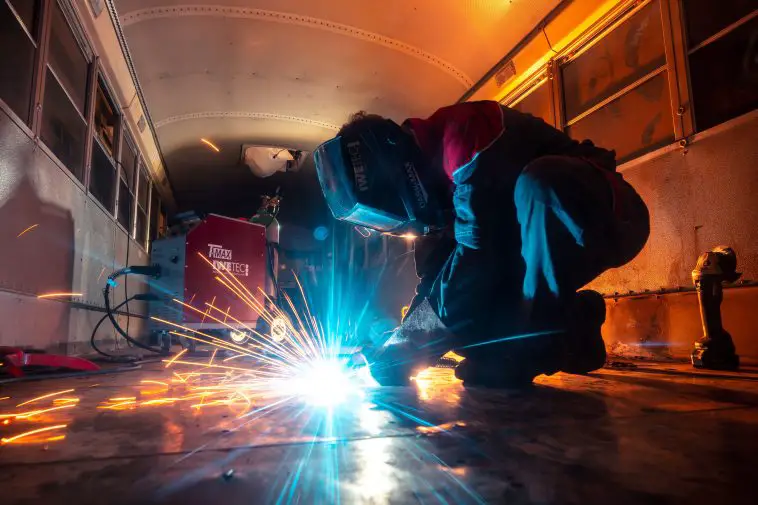Welding, often perceived as the dance of fire and metal, is a profession many debate diving into. One big question, “Is becoming a welder hard?” has been on the minds of many aspiring tradespeople. The answer isn’t a simple yes or no. While the journey to becoming a skilled welder can be challenging, it’s paired with the satisfaction of mastering a sought-after craft. However, another question asked quite a bit “Is being a welder hard?”, often has people scared of the demands of the job. The physical demands, precision required, and long hours can be strenuous, but the sense of accomplishment and the artistry involved make it a uniquely rewarding career for those willing to take on the challenge. In this article, we will talk about the process on becoming a welder as well as how hard it is to be a welder and the physical and mental demands the job takes.
Page Contents
Is Becoming a Welder Hard? The Education Pathway
Starting your journey into welding requires diving deep into the educational aspects of the craft. For beginners, numerous basic welding courses are available across various institutions and trade schools. These courses lay down the foundation, introducing students to the tools, materials, and basic techniques that are quintessential to the trade. As one progresses, acquiring certifications becomes paramount. Recognized certifications, like those from the American Welding Society (AWS) or the Canadian Welding Bureau (CWB), can significantly enhance job prospects and showcase a welder’s competency. These certifications often act as a testament to the quality and skill level of a welder. But, education in welding isn’t solely confined to theoretical knowledge. In fact, practical training takes precedence. Hands-on experience, under the guidance of seasoned professionals, helps in refining skills, understanding machinery, and grasping safety protocols. While theoretical training provides the essential background knowledge, it’s the practical experience that truly prepares one for the rigors and demands of welding in real-world scenarios. We have a more in-depth article on how to become a certified welder that you should also read.
Is Being A Welder Hard Work? Physically & Emotionally
The world of welding is not just about joining metals together; it requires a fusion of physical endurance and emotional resilience. Physically, welding is undoubtedly hard work. Welders often find themselves in demanding positions — bending, crouching, or even working in confined spaces. The job requires strength and stamina, as one may need to hold a particular pose for extended periods or maneuver hefty materials into position. The environment, too, plays a role. Prolonged exposure to intense heat, brightness from the arc, and the potential inhalation of fumes necessitate the use of protective gear and consistent adherence to safety protocols. All these things can play a role in you health long term, so it’s important to know how to avoid certain things.
Beyond the physical, the emotional aspects of welding can also be taxing. The job carries a weight of responsibility; a single error can compromise the integrity of a structure or piece. This demands acute concentration and a meticulous nature, often leading to mental and emotional stress. Moreover, the journey of mastering the craft requires patience. Every welder, irrespective of their experience, faces challenges and setbacks. It’s the emotional fortitude and passion for the craft that pushes them forward, helping them overcome hurdles and continue honing their skills. So, while the physical exertions answer the question of “Is being a welding hard work?” with a resounding yes, the emotional challenges underline the complexity and depth of the profession.
Is Being A Welder Unhealthy?
Many may ask, is being a welder bad for your health? But the simple answer is possibly. Welding does have some health risks due to the exposure to the different chemicals, heat and light, however, with the proper safety precautions and equipment you can have a long career as a welder without risking your health.
It’s important for perspective welders to note that the welding industry is well aware of these risks and has established numerous safety guidelines and best practices. When welders are well-equipped with the right safety gear, such as helmets with the appropriate shade of lens, respirators, and protective clothing, they drastically reduce their risk of health complications. Moreover, modern workshops and industrial setups often have ventilation systems and fume extractors to further mitigate the risks posed by welding fumes.
Who Can Become A Welder?
When considering a career in welding, many people wonder about the physical prerequisites. In essence, welding is an inclusive profession that welcomes individuals from all walks of life. Age, gender, or physical stature rarely serve as barriers. A common query is, “Can you be a welder with glasses?” The answer is a resounding yes. Many welders wear glasses, and modern welding helmets are designed to accommodate them comfortably. Good vision, corrected or otherwise, is essential for the precision the job demands. More than physical attributes, what truly matters is an individual’s dedication, patience, and willingness to learn. With the right training and safety precautions, almost anyone with a passion for the craft can embark on a fulfilling journey in the welding world.
Conclusion: Is It hard to become and be a welder?
In conclusion, addressing the central question, “Is becoming a welder hard?” unveils a multi-faceted response. Welding is indeed a challenging profession, blending physical exertion with emotional resilience. The educational pathway is robust, emphasizing both theoretical knowledge and hands-on experience. However, with dedication, anyone, can thrive in this field. The beauty of welding lies not just in its artistry, but in the opportunities it presents for continuous growth, making it a rewarding career choice for those ready to embrace its challenges.




